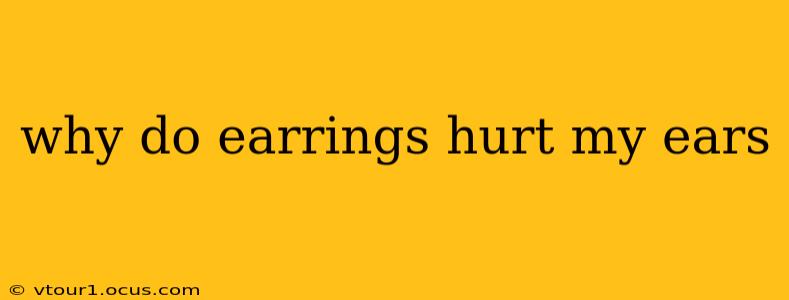Why Do Earrings Hurt My Ears? A Comprehensive Guide to Ear Piercing Pain
Earring pain is a common complaint, especially after a fresh piercing, but it can also occur with established piercings. Understanding the causes can help you alleviate the discomfort and prevent future problems. This guide explores the various reasons why earrings might hurt your ears, offering solutions and advice for managing the pain.
Why do my ears hurt after getting them pierced?
This is the most frequent reason for earring-related pain. The initial piercing is a wound, and like any wound, it needs time to heal. Pain in the first few weeks is normal and expected. This pain stems from:
- Inflammation: Your body's natural immune response to the trauma of the piercing. This leads to swelling, redness, and tenderness.
- Irritation: The earring itself, especially if it's not made of hypoallergenic material or is too large or heavy, can irritate the healing tissue.
- Infection: In severe cases, a bacterial or fungal infection can develop, causing intense pain, swelling, and possibly pus.
Why do my ears hurt even after my piercing has healed?
Even after your piercing has fully healed (which can take several months, depending on the location and individual), earring pain can still occur due to:
- Allergic Reaction: Nickel, a common metal in jewelry, is a frequent allergen. A reaction can cause itching, redness, swelling, and pain. Other metals can also trigger reactions in sensitive individuals.
- Irritation from Earrings: Certain earring materials, styles, or designs might irritate your earlobe even after healing. This includes rough edges, tight-fitting earrings, or earrings that snag on clothing or hair.
- Earlobe Stretching: Wearing heavy earrings over a long period can stretch your earlobes, leading to pain and discomfort.
- Infections (Recurring): Though less common, infections can recur even in healed piercings, especially with poor hygiene or trauma to the piercing.
- Keloids or Hypertrophic Scars: These are raised scars that can form at the piercing site, causing pain and discomfort.
What are the signs of an infected ear piercing?
Recognizing the signs of an infected piercing is crucial for seeking timely medical attention. Look out for:
- Increased pain and swelling: Beyond the normal post-piercing discomfort.
- Redness and warmth: The area around the piercing feels hot to the touch.
- Pus or discharge: A yellowish or greenish discharge from the piercing.
- Fever: A high body temperature can indicate a severe infection.
How can I prevent my earrings from hurting my ears?
Prevention is key! Here are some tips to minimize ear piercing pain:
- Choose a reputable piercer: A professional piercer will use sterile techniques and appropriate materials, minimizing the risk of infection and complications.
- Use hypoallergenic earrings: Opt for earrings made of materials like titanium, surgical steel, or gold (at least 14k).
- Clean your piercing regularly: Follow your piercer's instructions for cleaning your piercing. Gentle cleaning with saline solution is typically recommended.
- Avoid touching your piercing: This prevents the transfer of bacteria.
- Don't change your earrings too soon: Allow ample time for healing before changing earrings.
- Choose lightweight earrings: Heavy earrings can put extra stress on your earlobes.
- Be mindful of what your earrings come into contact with: Avoid snagging your earrings on clothing or hair.
What should I do if my earrings are hurting my ears?
If you're experiencing pain, consider the following:
- Remove the earrings: If the pain is severe or you suspect an infection, remove the earrings and seek medical attention.
- Apply a warm compress: This can help reduce swelling and pain.
- Use over-the-counter pain relievers: Ibuprofen or acetaminophen can help manage pain.
- Consult a doctor or piercer: If the pain persists, worsens, or you notice signs of infection, seek professional medical advice.
By understanding the causes of earring pain and following preventative measures, you can enjoy your earrings without discomfort. Remember, if you are concerned about the pain, always consult a medical professional.
